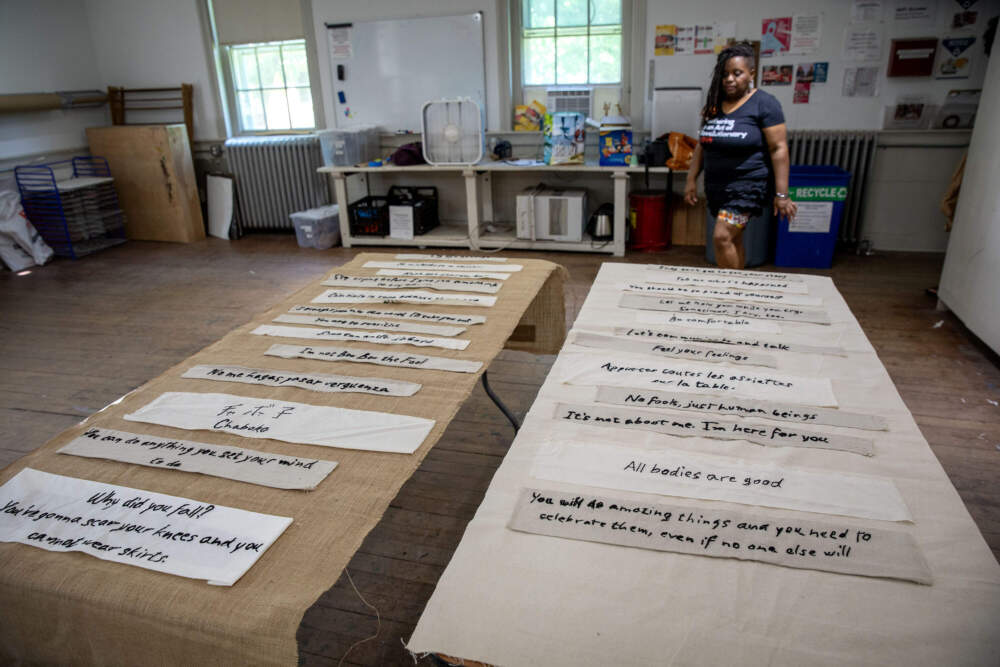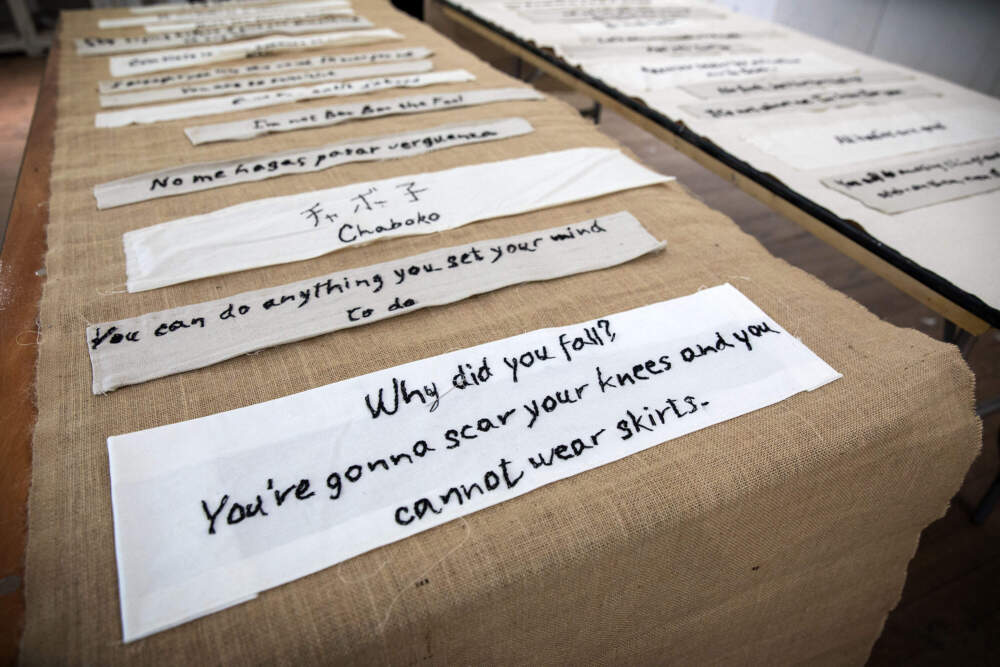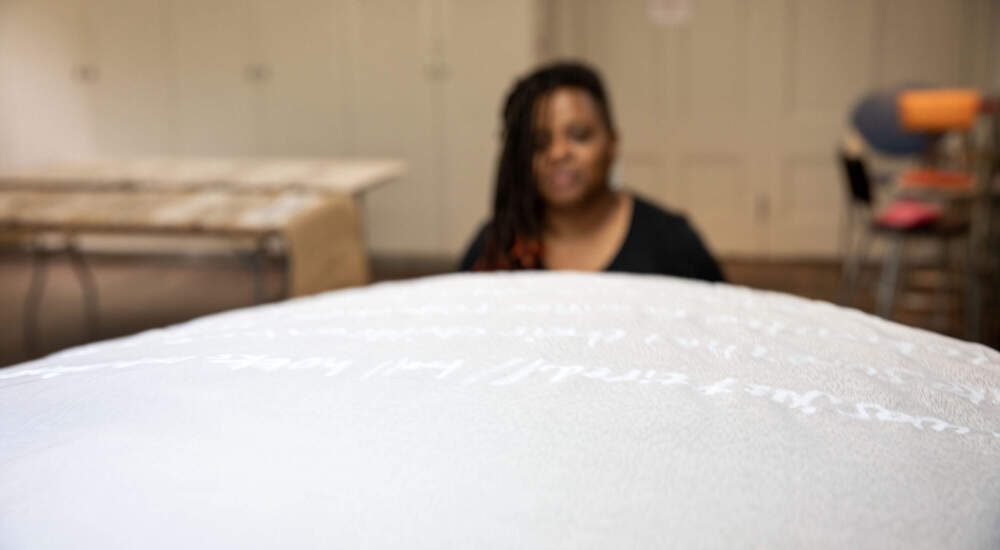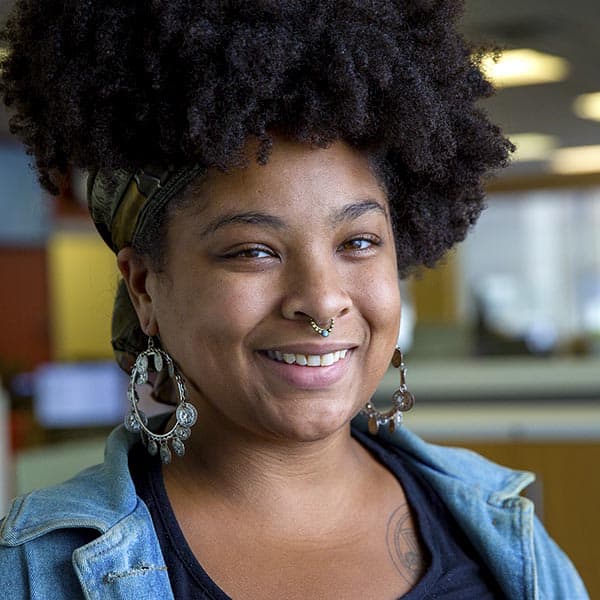Advertisement
'Mother Tongue' confronts the language of white supremacy in motherhood
Resume
One day, artist and educator Tanya Nixon-Silberg was with her 11-year-old child. She can't remember exactly what her kid said to her to test her mood but she recalls her response: "I'm not one of your little friends."
It's a common phrase in the Black community, usually repeated by mothers to their children as a warning or as a way to reinforce a hierarchy between parent and child. Nixon-Silberg heard it growing up, and now, she found herself repeating it.
"It was a flashback," Nixon-Silberg said. "My kid looked at me like, 'You're not my friend?' And I'm like, 'I am your friend!' I'm a good friend to adults. Am I a good friend to my kid? And that was something I really had to grapple with."
This exchange became the bedrock for Nixon-Silberg's "Mother Tongue," a textile project that explores some of the difficult conversations about being a mother of color.
"Mother Tongue" is a part of an exhibit called "Matrescence," curated by Catherine LeComte Lecce. With a focus on the theme of motherhood, the show features other artists like Alison Croney Moses and Zahirah Nur Truth. It runs through July 14 at MassArt's SoWa gallery.

For "Mother Tongue," Nixon-Silberg spoke with 14 mothers of color about their childhood experiences and what it's like to be a parent now. The participating mothers identified phrases they heard when they were kids and shared the phrases they say to their own children. It includes sayings in Japanese, English and Spanish.
"I call it a tapestry of decolonized parenting," said Nixon-Silberg of her three-panel piece.
The phrases the mothers heard growing up are hand-embroidered on a length of burlap, a rough fabric that mirrors the impact of the words themselves. Stitching the words manually was an intentional choice — Nixon-Silberg wanted to feel the emotion behind each phrase.
One of the sayings that graphic designer and artist Annika Sarin often heard was, "What will people say?" It wasn't something that her parents necessarily said, but it was heavily implied, especially under the pressure to assimilate into American culture.
"It's a very common saying in South Asian homes," Sarin said. "It was a large part of our childhood, wondering what would people say from a colonial lens."
Nixon-Silberg also interviewed Alison Croney Moses and Yawa Degboe for the project. Degboe, who immigrated to France from West Africa as a child, grew up hearing, "Your teacher is right."
"As a Black girl in a predominantly white space, there's a lot of things [Black girls] had to go through," Degboe said. "My mother always assumed that the institution, the school was right."
Advertisement
Moses heard, "'Why did you fall? You're going to scar your knees and you can't wear skirts ...' I'd be playing outside and fall, skin my knee," Moses said. "And as my mom is fixing it up, she says that phrase ... I remember having to shake off the insecurity of scarring."

Though mothers of color may not intend too, they sometimes replicate or perpetuate Western or dominant cultural standards when it comes to their children.
"There's very little space where you can interrogate white supremacy within parenthood," said Nixon-Silberg. "I wanted to start doing that."
Nixon-Silberg captures what the mothers now tell their children on another panel made of a softer and much more forgiving textile.
Sarin chose the phrase: "No one gets to tell you who you are, you create your own narrative." She explained, "I'm hoping that it's more freeing, that it allows them to be who they are and see themselves the way they want to."
Degboe, who wanted her children to know that what they have to say is important, relayed to them: "Your voice matters. And the words that you choose carry weight."
Moses, an artist who works with wood, has come to appreciate the risk that comes with activities that can lead to skinned knees or a splinter. She wants her children to experiment, even if they fall. So she said, "The scar will remind you of the fun you had that day."
In this way, "Mother Tongue" grapples with what it means to be a mother of color living under racist and sexist systems. Degboe, Moses, Sarin and Nixon-Silberg all emphasize that mothers are often doing the best they can under the circumstances they're given.

This is represented in the third panel, a stretch of gauzy fabric that connects the first and second pieces. It contains the mothers' reflections on their upbringing and represents how they went from hearing those less empowering phrases to creating ones of their own for their children. Sentences like, "I think my mother was just tired" demonstrate the nuanced relationships children of color can have with their parents — there is a latent understanding that it's the systems of inequity that are the problem in parenting, not the mothers themselves.
The important part of "Mother Tongue" is remembering to have "grace for things that we heard growing up, grace for the things that we might've said to our kids already. And grace for other mothers that are doing what they can within the structures that we're all living in," said Nixon-Silberg.
Decolonizing parenting is hard but necessary work. "Mother Tongue" helps chart a course to navigate those complicated waters. It's pertinent to confront racist and sexist structures.
"I think this piece is to really give folks back to themselves," she pointed out. "Permission to be like, 'Yeah, [it] sucked that I heard that' but also permission to say, 'Hey, I have another choice and I can do something different.' "
This segment aired on June 25, 2024.
